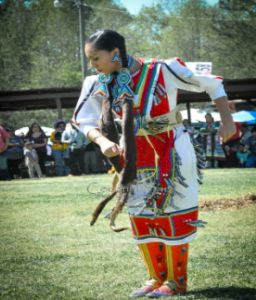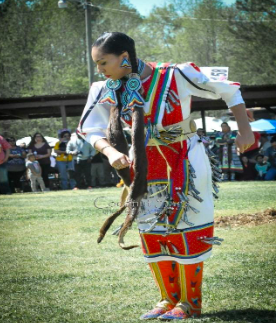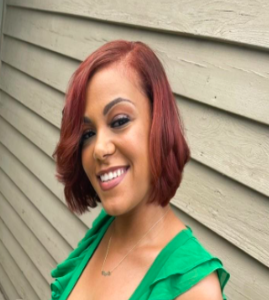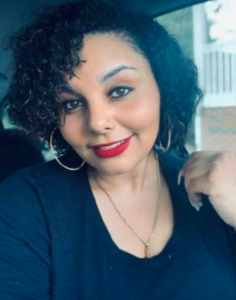“The American Indian is of the soil, whether it be the region of forests, plains, pueblos, or mesas. He fits into the landscape, for the hand that fashioned the continent also fashioned the man for his surroundings. He once grew as naturally as the wild sunflowers; he belongs just as the buffalo belonged.”
This quote embodies the essence of Native American Heritage Month because it recognizes those who had their land stolen. Native Americans are the original keepers of this land.
In 2013, I became a member of Sigma Omicron Epsilon Sorority, Inc. which is a Native American sorority. I joined this organization because I felt a special connection to those who were in the organization, and I wanted to learn more about their heritage, culture, and traditions. Since then, I have attended many cultural events and witnessed some of my sorors dance proudly in pow wows. I have decided to interview three of my sorors, Olivia Richardson, Cheyenna Francis, and Brooke Coley from the Haliwa Saponi Tribe of Hollister, NC to gain further insight into how culture plays a part in their lives.
Olivia Richardson
 What are some cultural activities that you partake in?
What are some cultural activities that you partake in?
I participate in powwows at every opportunity that I have. I also do dance performances and informational presentations to educate others further about our culture. I really enjoy participating in traditional ceremonies back home whenever they have them, as well. I’ve assisted with planning powwows in the past, and I had the opportunity to partner with Dix Park Conservancy along with some other Natives in the RDU area to plan the 1st Annual Dix Park Inter-Tribal Powwow a few weeks ago. Before COVID, we had a Triangle Cultural Class to help indulge Natives in the RDU area further in their culture as well as provide a place for us to gather and talk.
What is the significance behind these activities?
This is my way of helping to keep our culture and traditions alive. I have been dancing since a very young age. Growing up, participating in these activities was more for the good feelings that it always gave me. As I’ve gotten older, I realize how important it is not only to allow us to pass on our traditions and ways for generations to come, but it also helps to mitigate the stereotypes against our culture. The stereotypes will probably never go away, but I know that I’m doing my part to help remove them.
What advice (if any) would you give your younger self about upholding cultural traditions?
I learned a lot growing up in my tribal community regarding my culture and the history of our people and Natives of NC, but one thing I would tell my younger self is to take more initiative to learn about Natives outside of NC. During my teenage years, I had the opportunities to network with Native Youth from all over Indian country. There were many great relationships made during that time. However, I would tell my younger self to inquire more about their traditions and ways that are extremely significant to their tribes. That way, I could pass that knowledge along as well as I do with my tribal history.
What is something that you want people to know about the Haliwa Saponi tribe?
I want people to know how much we admire the youth of our tribe. Our youth excel both academically and culturally. They’re eager to learn more about their culture, true ambassadors for our people when they travel places, and have a strong drive to become leaders in Indigenous and non-Native organizations. They carry themselves very well. I see my younger self in them, and it always motivates me when I see them doing great things for themselves and their people.
What would you like to see develop in the future in your community (i.e. businesses) and why?
I would like to see small businesses grow and thrive in our tribal community. Hollister is a very remote area, and it takes about 25-30 minutes to travel to the nearest town to shop for major groceries, shop for clothing, engage in professional services, etc. We have some great local talent in our community that’s worth starting a business so that our people can shop locally. One of my goals is to complete my Certification in Public Accounting so that I can open an accounting and tax firm to help our tribal community, both individually and professionally. I want to see farms, locally owned grocery stores, a YMCA, and other important small businesses start up so that our community can grow and thrive.
What advice would you give to the younger generation about keeping Native culture and traditions alive?
The best piece of advice that I can give our youth is to keep the drive that they have for both their culture and their selves. Continue to run for those leadership positions. Continue to participate in academic and sports programs. Attend those powwows and ceremonies every moment that you get. Keep educating those who desire to learn about who we are. And, most importantly, don’t let the stereotypes keep you from being the best Indigenous individual that you were meant to be. All of this is preparing you not just for life, but it’s also preparing you to help lead our people and tribe one day. Never forget who you are and never give up.
Cheyenna Francis
 What are some cultural activities that you partake in?
What are some cultural activities that you partake in?
When I was growing up, I would participate in a weekly cultural class. In culture class, the younger generation had the opportunity to interact with the elders as well as tribal leaders. The classes kept us physically healthy and educated on culture. For me, culture was my outlet. I also participated in pottery making and beading, as well. I had the opportunity to travel as tribal royalty to represent our people on behalf of the youth. I also traveled to leadership conferences as a tribal representative and learned how I can be an advocate for my people. I utilized this platform to encourage others to learn about Native culture.
What is the significance behind these activities?
I was able to educate others on the culture and create a sense of identity for myself. I also could be a role model for younger people, and it gave me a sense of belonging.
What advice would you give your younger self about upholding cultural traditions?
I would tell myself to take advantage of more opportunities. I missed out on a traditional coming of age ceremony where you earn a tribal name in our language. I also would have run for tribal princess.
What is something that you want people to know about the Haliwa Saponi tribe?
We are resilient and vigilant. We thrive on community, and whenever there is loss, we all pull together. Also, we make sure to keep our traditions alive by encouraging our youth to participate at a very young age.
What would you like to see develop in the future in your community? Why?
I would like to see a youth involvement community center built in the future. This center would assist with homework and provide youth with an opportunity to have conversations with the elders in the community. This would allow for youth to express themselves, and it would also help parents who are still working whenever their children get out of school.
What advice would you give to the younger generation about keeping Native culture and traditions alive?
I would stress the importance of culture and tradition. It is bigger than yourself. Think about “am I being represented in the media, school, and on the job.” Representing yourself well reflects the tribe and breaks stereotypes by defeating all the odds set against you.
Brooke Coley
 What are some cultural activities that you partake in?
What are some cultural activities that you partake in?
Pow wows mainly,but I also have participated in conferences about education of native issues.
What is the significance behind these activities?
Pow wows celebrate our native heritage and culture through dance, fellowship, and delicious traditional foods, it brings awareness that we are still here and pays homage to our ancestors
What advice would you give your younger self about upholding cultural traditions?
My younger self was overlooked as a Black Native, however, as I became active in school, I learned more about being Native than I did at home because of the stigmas associated with being Native. There was racism in the town I am from, so it took me a while to find my identity. However, I feel at times I still am not quite sure how to feel or navigate my heritage. I would have loved to become more involved but if you did not look a certain way or knew the right people it was hard to obtain knowledge. It seemed that it was more of a challenge to uphold traditions without this information being passed on to you.
What is something that you want people to know about the Haliwa Saponi tribe?
We are a giving people and we come together during times of need for one another.
What would you like to see develop in the future in your community? Why?
I would like to see more inclusion for community members. I would love everyone to be able to join in and advance food security, community centers for ALL, more appreciation for the old and young members of the community and better use of funds.
Olivia, Cheyenne and Brooke all shared that they would like to see more resources available in their community like a community center and more businesses in closer proximity. It’s also important to note that as a community, the Haliwa Saponi Tribe comes together to uplift one another. In these days and times, that is imperative because it truly takes a village. Native Americans have a strong sense of community that is admirable and something that we should all aspire to. Instead of encouraging division and competition, let’s uplift our brothers and sisters by celebrating one another.
Learn more about the Haliwa Saponi Tribe here.



There are no comments
Add yours